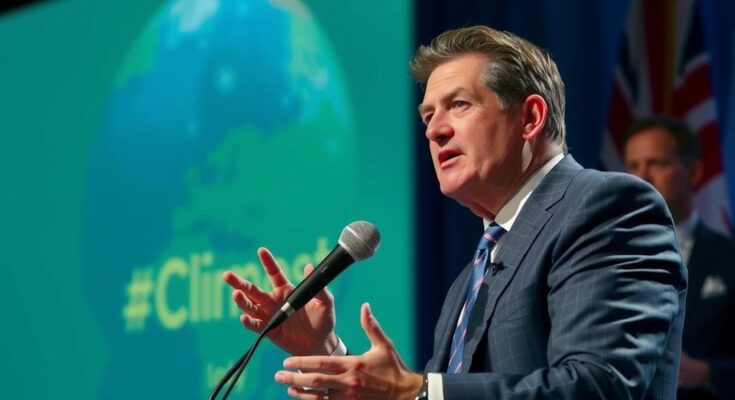British PM Keir Starmer aims to reclaim climate leadership for the UK by setting an ambitious target to reduce emissions by 81% by 2035, contrasting with prior conservative policies. Starmer emphasizes the interconnection between climate and national security, proposing a decarbonized energy future and increased wind energy production. His plan reflects recommendations from the Climate Change Committee and seeks to position the UK as a key player in global climate efforts.
British Prime Minister Keir Starmer, upon entering Downing Street, aims to restore the UK’s prominence in the global battle against climate change, contrasting sharply with former Prime Minister Rishi Sunak’s approach. During COP29 in Baku, Starmer set a bold target of reducing greenhouse gas emissions by at least 81% by 2035 compared to 1990 levels. This ambitious agenda follows a prior commitment of a 68% reduction by 2030 and underscores the goal of achieving carbon neutrality by 2050. Starmer emphasized the UK’s role as a key ally for countries, investors, and businesses, effectively repositioning the nation as a leader in climate initiatives. Starmer, one of the few Western leaders attending COP29, stated, “This COP, the UK has sent a clear message […]: We are a key partner for countries, for investors and for businesses, and we are renewing UK climate leadership.” This commitment marks a stark departure from Sunak, who initially opted out of COP27 before reversing his decision. Starmer’s administration intends to reverse previous delays in climate policy, including the ban on new petrol and diesel vehicles and advancements in onshore wind energy projects. The Prime Minister maintains that a proactive stance on climate transition is essential for economic and national security, asserting, “There is no national security, there is no economic security, there is no global security without climate security.” The UK’s latest Nationally Determined Contribution aligns with the Climate Change Committee’s recommendations, deeming an 81% reduction by 2035 feasible. Furthermore, the government plans to achieve completely decarbonized domestic energy production by 2030, significantly expanding North Sea wind farm capabilities and closing the last coal-fired power station in Nottinghamshire.
The discussed article highlights the UK’s renewed commitment to addressing climate change under the leadership of Prime Minister Keir Starmer. This commitment is articulated through ambitious targets for emissions reductions and a strong emphasis on the importance of global climate actions. Starmer’s government plans to fortify the UK’s position as a climate leader, focusing on innovative technologies and economic growth while ensuring security in various sectors. Previous administrations faced criticism for their slowing efforts on climate policy, making this shift particularly noteworthy.
In summary, Prime Minister Keir Starmer is committed to reinstating the UK as a leader in combating climate change, setting ambitious emissions reduction targets and promoting economic growth through environmental strategies. His administration’s direction contrasts significantly with that of Rishi Sunak’s, aiming for a carbon-neutral future and emphasizing that climate security is integral to national and global security.
Original Source: www.lemonde.fr




